
Find Help
More Items From Ergsy search
-

What is the prognosis for someone with CFS?
Relevance: 100%
-
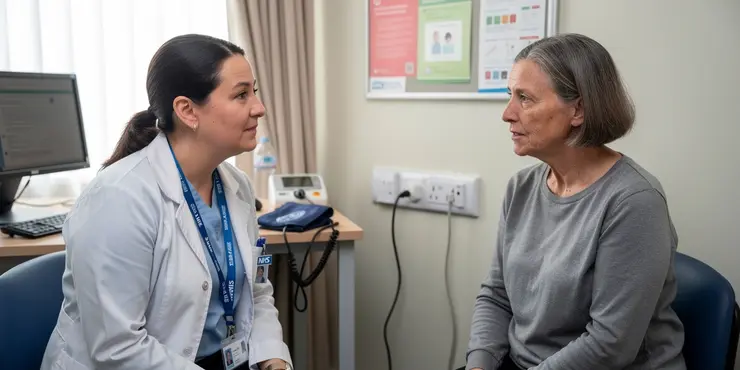
Can CFS be prevented?
Relevance: 55%
-

How does CFS differ from regular fatigue?
Relevance: 54%
-
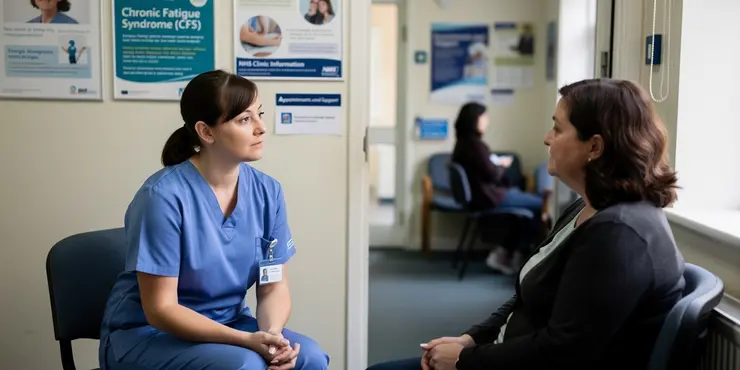
Why is it important to increase awareness about CFS?
Relevance: 49%
-

Can CFS symptoms fluctuate over time?
Relevance: 49%
-
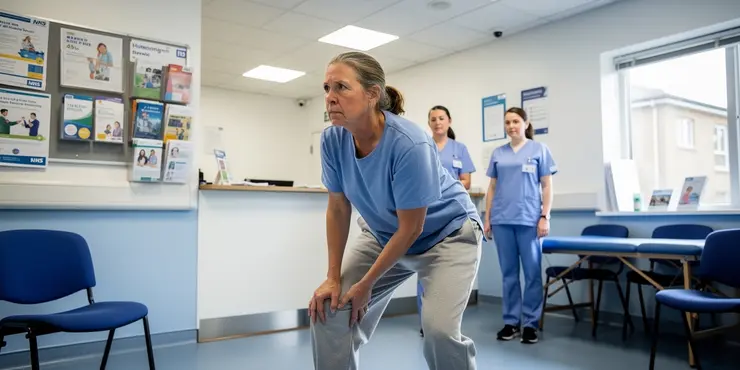
Does physical exercise help people with CFS?
Relevance: 48%
-
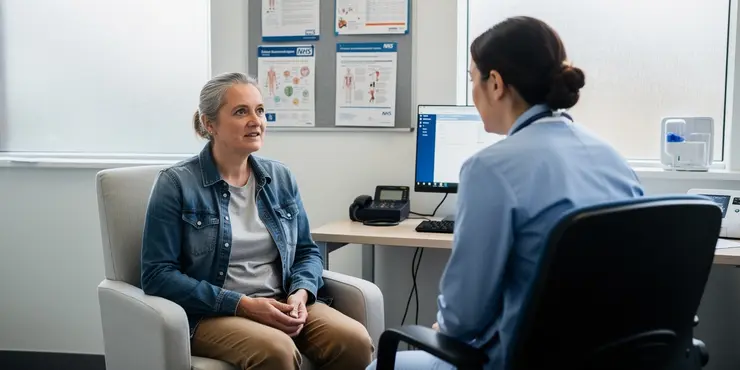
How does post-exertional malaise relate to CFS?
Relevance: 47%
-

What is the prognosis for someone with heart failure?
Relevance: 45%
-

What is the prognosis for viral meningitis?
Relevance: 42%
-
What is chronic fatigue syndrome?
Relevance: 32%
-

Is chronic fatigue syndrome contagious?
Relevance: 31%
-

Who is at risk of developing chronic fatigue syndrome?
Relevance: 28%
-
Can children develop chronic fatigue syndrome?
Relevance: 28%
-

What role do infections play in chronic fatigue syndrome?
Relevance: 28%
-

Are there psychological aspects to chronic fatigue syndrome?
Relevance: 27%
-

How is chronic fatigue syndrome treated?
Relevance: 27%
-
What is the prognosis for individuals with mitochondrial disease?
Relevance: 25%
-

What causes chronic fatigue syndrome?
Relevance: 19%
-

What's the difference between seminomas and non-seminomas?
Relevance: 15%
-

What is a seminoma?
Relevance: 15%
-
Is chronic fatigue syndrome a mental illness?
Relevance: 14%
-

Ovarian Cancer
Relevance: 14%
-

Can chronic fatigue syndrome be managed with lifestyle changes?
Relevance: 13%
-
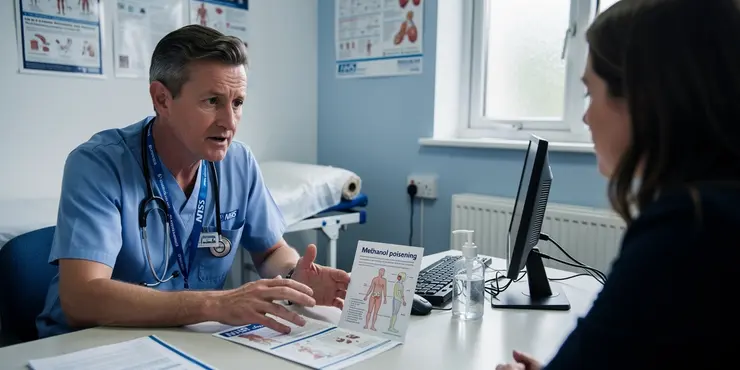
Can methanol poisoning cause permanent damage?
Relevance: 13%
-

How is chronic fatigue syndrome diagnosed?
Relevance: 13%
-
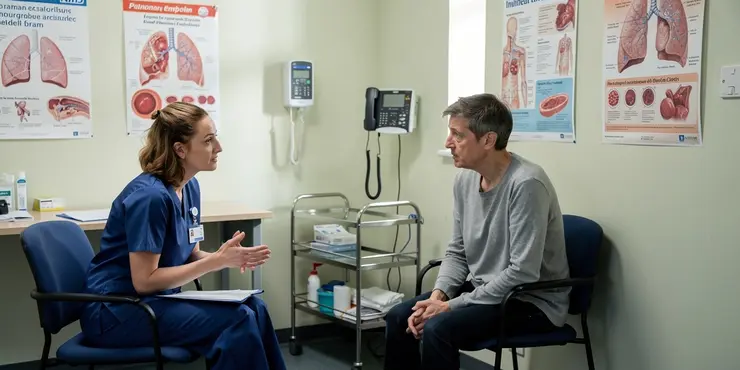
What is a pulmonary embolism?
Relevance: 13%
-

Is there a cure for chronic fatigue syndrome?
Relevance: 13%
-

What are the stages of testicular cancer?
Relevance: 13%
-

Can AI predict lung cancer survival rates?
Relevance: 12%
-

What is the survival rate for bowel cancer?
Relevance: 12%
-

Can methanol poisoning be treated?
Relevance: 11%
-

Is there a risk of permanent nerve damage?
Relevance: 11%
-

What is Pancreatic Cancer?
Relevance: 9%
-

Understanding Facial Palsy
Relevance: 9%
-

Skin cancer education
Relevance: 9%
-

How common is testicular cancer?
Relevance: 9%
-

Endometrial Cancer
Relevance: 9%
-

What is the life expectancy after a motor neurone disease diagnosis?
Relevance: 9%
-

What is testicular cancer?
Relevance: 8%
-

What is testicular cancer?
Relevance: 8%
Understanding the Prognosis for Chronic Fatigue Syndrome (CFS)
Chronic Fatigue Syndrome, also known as Myalgic Encephalomyelitis (ME/CFS), is a complex, long-term illness characterized by extreme fatigue and a variety of other symptoms. Prognosis refers to the likely course and outcome of a disease, and it can vary significantly among individuals with CFS. Understanding the prognosis for someone with CFS is challenging due to the variability in symptoms and severity experienced by patients.
Factors Influencing Prognosis
The prognosis for individuals with CFS is influenced by several factors, including the severity of symptoms, the presence of comorbid conditions, timely diagnosis, and access to supportive care. One of the main challenges in predicting outcomes is the individual nature of the illness, as symptoms can fluctuate in intensity and duration. Some people may experience periods of relative improvement or remission, while others may have a more chronic course.
General Outlook
Research on the long-term prognosis of CFS shows mixed results. Some studies suggest that a small percentage of people may experience significant improvement or recovery over time. However, many individuals continue to experience symptoms and reduced quality of life for several years. The fluctuating nature of the illness means that even when symptoms improve, they can return or worsen at any time.
Overall, while complete recovery is reported by a minority, many people with CFS experience partial improvement but may continue to face limitations in their daily activities. Supportive therapies, lifestyle modifications, and symptom management can significantly improve quality of life, even if they do not lead to full recovery.
Management and Support
Effective management of CFS often involves a combination of medical treatment, lifestyle changes, and support. Patients may benefit from working with healthcare providers to develop a personalized management plan. This plan may include pacing strategies to manage energy levels, cognitive behavioral therapy (CBT) for coping skills, and medications to address specific symptoms such as pain or sleep disturbances.
Support from family, friends, and patient support groups can also play a crucial role in improving outcomes for individuals with CFS. Access to accurate information and understanding of the condition can help patients and their support networks better manage the illness.
Importance of Research
Ongoing research is essential to improve the prognosis for people with CFS. As understanding of the underlying causes and mechanisms of the illness advances, there is hope for more effective treatments and interventions in the future. Public awareness and continued funding for CFS research can contribute to better outcomes and potentially change the prognosis for those affected by this challenging condition.
Understanding What Happens with Chronic Fatigue Syndrome (CFS)
Chronic Fatigue Syndrome, also called ME/CFS, makes people very tired and causes other problems. People with CFS feel extremely tired all the time. "Prognosis" means what might happen with an illness. This can be different for everyone with CFS because the symptoms and how bad they are can change from person to person.
Things That Affect What Might Happen
What happens to someone with CFS depends on different things. This includes how bad their symptoms are, if they have other health problems, how quickly they find out they have CFS, and the care they get. Predicting what will happen can be hard because CFS affects everyone differently. Some people might feel better for a while, but others might stay the same or get worse.
What to Expect
Research about CFS shows different results. Some people might feel much better or even recover after some time. However, many still feel tired and unwell for many years. Because symptoms can change, people can feel better, but symptoms might come back or get worse.
Overall, not many completely recover. However, many feel somewhat better but still have trouble doing everyday things. Treatments, changes in how you live, and managing symptoms can help people feel better, even if they don't completely recover.
Getting Help and Support
Taking care of CFS needs different approaches. Doctors can help by making a plan just for the person with CFS. This plan might include ways to save energy, therapy to help with stress, and medicine for pain or sleep problems.
Family, friends, and support groups are important too. They can help people with CFS feel better by being understanding and supportive. Having good information can help everyone manage CFS better.
Why Research is Important
Research is needed to help people with CFS get better care. Learning more about what causes CFS and how it works might lead to better treatments. Raising awareness and funding research can lead to better outcomes for those living with CFS.
Frequently Asked Questions
What is Chronic Fatigue Syndrome (CFS)?
Chronic Fatigue Syndrome (CFS), also known as Myalgic Encephalomyelitis (ME), is a complex disorder characterized by extreme fatigue that cannot be explained by any underlying medical condition. The fatigue worsens with physical or mental activity but doesn't improve with rest.
What is the prognosis for someone with CFS?
The prognosis for someone with CFS varies widely among individuals. While some may improve over time, others may experience persistent symptoms for years. Complete recovery is rare, but many can manage symptoms through lifestyle changes and medical interventions.
Can people with CFS experience periods of remission?
Yes, some individuals with CFS may experience periods of remission where symptoms improve significantly. However, symptoms can return or fluctuate without warning.
What factors influence the prognosis of CFS?
Several factors can influence the prognosis of CFS, including the severity of symptoms, early diagnosis, effective symptom management, and the individual's overall health and lifestyle.
Is CFS considered a progressive illness?
CFS is not typically considered a progressive illness like some neurodegenerative diseases. However, symptoms can be debilitating and may change in intensity over time.
Can early diagnosis improve the prognosis of CFS?
Early diagnosis and intervention can help manage symptoms more effectively, potentially improving the long-term outlook for individuals with CFS.
Is complete recovery from CFS common?
Complete recovery from CFS is rare, but some people experience significant improvement in their symptoms. Management often focuses on improving quality of life rather than complete recovery.
What treatment options are available for CFS?
Treatment options for CFS include cognitive behavioral therapy (CBT), graded exercise therapy (GET), medications to manage specific symptoms, and lifestyle changes like pacing, healthy diet, and stress management.
How does managing stress affect the prognosis of CFS?
Managing stress can significantly affect the prognosis of CFS, as stress can exacerbate symptoms. Stress management techniques such as mindfulness, meditation, and therapy can be beneficial.
Can lifestyle changes improve the prognosis of CFS?
Yes, lifestyle changes such as regular but not overexertive physical activity, a balanced diet, and adequate sleep can help manage symptoms and improve overall health, potentially leading to a better prognosis.
Is the prognosis of CFS different for children than adults?
The prognosis for children with CFS can sometimes be better than for adults, as children and adolescents may have a higher chance of improvement and even recovery over time.
How long do CFS symptoms last?
CFS symptoms can last for months to years. The duration varies widely among individuals, with some experiencing long-term chronic symptoms while others may see improvement over time.
What role do healthcare professionals play in the prognosis of CFS?
Healthcare professionals can play a significant role by providing accurate diagnosis, symptom management strategies, and supportive care to improve a patient's quality of life.
Can medications alter the prognosis of CFS?
While there is no cure for CFS, medications can help manage specific symptoms like pain, sleep disturbances, and depression, potentially improving quality of life.
Are there any promising research developments in CFS prognosis?
Research is ongoing to better understand CFS and its potential treatments. Advances in biomedical research are crucial for developing more effective therapies and improving the prognosis of CFS.
How important is patient education in the prognosis of CFS?
Patient education is vital as it empowers individuals with CFS to manage their condition more effectively through understanding potential triggers, self-care strategies, and available treatments.
Can support groups impact the prognosis of someone with CFS?
Support groups can provide emotional support, practical advice, and a sense of community, which can positively affect a patient's outlook and ability to manage their condition.
Does the severity of initial symptoms affect the long-term prognosis of CFS?
In some cases, individuals with milder initial symptoms may have a better long-term prognosis, although this is not always the rule.
Are there any risk factors that might worsen the prognosis of CFS?
Chronic stress, lack of support, comorbid psychological conditions, and not adhering to treatment recommendations can potentially worsen the prognosis of CFS.
Can mental health interventions improve the outlook for someone with CFS?
Yes, mental health interventions like cognitive behavioral therapy can help manage symptoms of anxiety and depression, which are common in CFS patients, and thus potentially improve their overall prognosis.
What is Chronic Fatigue Syndrome (CFS)?
Chronic Fatigue Syndrome (CFS) is a sickness. It makes people feel very, very tired all the time. Even resting does not make the tiredness go away. People with CFS might also have headaches, trouble thinking, or feel dizzy.
If you think you have CFS, talk to a doctor. They can help figure out what to do.
Using pictures, breaking information into small parts, and reading out loud can help understand better.
Chronic Fatigue Syndrome (CFS), also called Myalgic Encephalomyelitis (ME), makes you very tired. This tiredness is not caused by other health problems. Being more active makes the tiredness worse, and resting does not help.
What will happen to someone with CFS?
CFS stands for Chronic Fatigue Syndrome. It means feeling very tired for a long time.
Everyone with CFS is different. Some people might get better in a few months, but others might take longer. Some may not feel completely better.
Doctors and nurses can help by giving advice and medicine.
It is important to rest and do things that make you feel good. Tell a friend or family member how you feel so they can help you.
You can use a calendar to plan activities.
If reading is hard, audiobooks or reading apps can help.
The outlook for someone with CFS (Chronic Fatigue Syndrome) is different for each person. Some people get a bit better over time, while others might feel tired and unwell for a long time. It's not common to get fully better, but many people can feel a bit better by changing how they live and getting help from doctors.
Can people with CFS have times when they feel better?
Some people with CFS (Chronic Fatigue Syndrome) might have days when they feel more energetic or their symptoms get better. It's like having breaks from feeling very tired all the time.
If you have CFS, making sure you rest and take care of yourself can help. Talking to a doctor or someone who understands CFS can also be useful.
Yes, some people with CFS can feel better for a while. This is called remission. But, the symptoms can come back anytime without warning.
What affects the outlook of CFS?
CFS stands for Chronic Fatigue Syndrome. This is when a person feels very tired all the time.
Here are some things that can change how CFS affects someone:
- Getting the right help: Seeing the right doctors and getting good advice can help.
- Support from others: Friends and family can make a big difference. Having people who understand can help a lot.
- Rest and sleep: Getting enough rest is very important.
- Exercise: Light exercise can sometimes help, but it should not make you more tired.
It can be useful to write down how you feel. Keeping a diary of your tiredness and energy levels can help you and your doctor understand better.
Helpful tools: Try using apps that remind you to rest and drink water. These little things can help improve your day-to-day life.
There are many things that can change what happens with CFS. These include how bad the symptoms are, finding out early, taking care of symptoms well, and the person’s health and way of living.
Does CFS get worse over time?
CFS is a kind of sickness that does not usually get worse over time, unlike some brain diseases. But, it can make you feel very tired and sick. How bad you feel can change over time.
Can finding out early help people with CFS get better?
CFS stands for Chronic Fatigue Syndrome. It makes people feel very tired. If doctors find out that someone has CFS early, can they help the person feel better?
Finding out early could help doctors make a plan. This plan might include medicine, exercise, or talking to someone for support.
People with CFS can use things like picture charts or ask someone to help them understand what the doctor says.
Finding out if someone has CFS early can help a lot. It means we can start helping them sooner. This can make them feel better and help them in the future.
If you or someone you know is having a hard time, you can talk to a doctor. They can help figure out what is wrong and how to help.
Using picture cards or reading out loud can also be helpful. They make it easier to understand and remember things.
Do people often get better from CFS?
Getting all better from CFS doesn't happen often. But some people feel much better with their symptoms. It is important to try and make life better, even if you don't get completely better.
Here are some tips that can help:
- Rest a lot and take breaks when you feel tired.
- Do things slowly and don't rush.
- Talk to your doctor for advice and help.
What can help if you have CFS?
If you have CFS, there are things that can help you feel better.
- Rest and Sleep: Make sure you get enough rest and sleep.
- Healthy Food: Eat good food with lots of fruits and vegetables.
- Exercise: Gentle activities like walking or stretching can help. Start with a little bit and slowly do more.
- Talking Help: Talking with someone about how you feel can be good. This could be a family member or a counselor.
- Medicine: Sometimes, doctors might give you medicine to help with pain or sleep.
Everyone is different, so what helps can be different for each person. It’s important to talk to your doctor about what might work best for you.
Tools that can help:
- Planner: Use a planner to help remember things.
- Relaxation Apps: Apps can teach you ways to relax.
If you feel very tired and the doctor says you have CFS, there are ways to help you feel better:
- Talking to a therapist can help you feel better about things. This is called CBT.
- Doing a little exercise every day can help make you stronger. The amount of exercise should go up slowly. This is called GET.
- Medicines can help with some problems like pain or trouble sleeping.
- It also helps to have a good routine. Try eating healthy food and find ways to keep calm and not get stressed. Try to do things at your own pace and not too fast.
How can handling stress help with CFS?
CFS stands for Chronic Fatigue Syndrome. It makes you feel very tired. Managing stress means learning how to stay calm and not worry too much. Being less stressed can help people feel a bit better. Here are some simple tips:
- Practice deep breathing. Take slow, deep breaths to relax.
- Do gentle exercises like walking or stretching.
- Talk to someone you trust about how you feel.
- Try listening to calming music or sounds.
Always remember to ask a doctor for advice too.
Managing stress is important for feeling better if you have CFS. Stress can make you feel worse. You can try things like mindfulness, meditation, or talking to a therapist to help you manage stress.
Can changing your daily habits help if you have CFS?
Yes, you can feel better by making some changes in your daily life. Try to do exercise, but not too much. Eat healthy foods. Sleep well at night. These things can help you feel better and stay healthy.
Do kids get better from CFS in a different way than grown-ups?
Children with CFS might get better more easily than adults. They have a good chance to improve and feel well again as time goes by.
How long do CFS symptoms last?
People with CFS feel very tired. This can last a long time. Everyone is different, so it is hard to say how long it will last. Some people feel better in a few months. Others take years. Rest and taking care of your body can help.
If reading is hard, try using tools that read the text out loud for you. Talking to a friend or family member can also help you understand better.
CFS symptoms can last a long time. It can be months or even years. It is different for everyone. Some people feel the symptoms for a long time. Others may start to feel better after a while.
What do doctors and nurses do to help people with CFS?
Doctors and nurses can help a lot. They can find out what is wrong, help make the symptoms feel better, and give care to make the patient feel happier.
Can medicine change what happens with CFS?
There is no cure for CFS. But medicine can help with some problems. Medicine can help with pain, trouble sleeping, and feeling sad. This can help you feel better.
Are there any new studies that help predict what will happen with CFS?
CFS stands for Chronic Fatigue Syndrome. It's an illness that makes people feel very tired.
Scientists are doing research to learn more about CFS. They want to find out what happens to people with CFS over time.
Some tools that might help learn more include:
- Talking to doctors who know a lot about CFS.
- Using apps to keep track of how you feel each day.
- Joining support groups to share and learn from others.
Scientists are trying to learn more about CFS and how to treat it. New research is important to find better ways to help people with CFS and make them feel better in the future.
How does learning about their illness help people with CFS feel better?
Learning about your health is really important. It helps people with CFS (Chronic Fatigue Syndrome) feel better.
When you know more, you can understand what makes CFS worse, how to take care of yourself, and what treatments can help.
If reading is hard, you can try using audiobooks or ask someone to read with you.
Can support groups help someone with CFS feel better?
CFS stands for Chronic Fatigue Syndrome.
CFS is a health problem that makes people feel very tired for a long time.
Support groups are meetings where people with the same problem talk and help each other.
These groups can help people feel less alone and find ways to feel better.
Talking to others and sharing can sometimes make people feel happier and more hopeful.
Support groups might not take away the tiredness, but they can still help.
Some people use tools like relaxation techniques or talking to a therapist to feel better.
Support groups help people feel better. They give support, share good advice, and make people feel part of a group. This can help someone feel more positive and manage their health better.
Do bad starting symptoms make CFS worse later?
CFS stands for Chronic Fatigue Syndrome. It means being very tired for a long time.
This question asks if having bad symptoms at the start makes CFS worse later.
If you find it hard to read, you can try:
- Asking a friend or family member for help.
- Using a text-to-speech tool to hear the words.
- Breaking the text into smaller parts.
Some people start with only a few mild symptoms. This can mean they get better more easily in the long run. But, it doesn't happen for everyone.
What things can make Chronic Fatigue Syndrome (CFS) worse?
Some things can make CFS worse.
- Stress can make CFS worse. Try to relax and stay calm.
- Getting sick with other illnesses can also make CFS worse.
- Not getting enough sleep can make you feel more tired.
- Doing too much can make CFS worse. Rest when you need to.
It can help to talk with a doctor or someone who knows about CFS.
Tips that might help:
- Write down how you feel each day.
- Use a planner to keep track of activities.
- Set small goals for yourself.
Always feeling stressed, not getting help from others, having other mental health problems, and not following doctor’s advice can make Chronic Fatigue Syndrome (CFS) worse.
Can Help for Your Feelings Make Life Better for Someone with CFS?
CFS stands for Chronic Fatigue Syndrome. It is a condition that makes people feel very tired.
Sometimes, talking to someone can help. This is called a mental health intervention.
Some people use techniques like deep breathing or mindfulness. These can help you feel calm and happy.
Support from friends or family is also important.
Yes, talking therapy can help people feel better if they are worried or sad. Many people with CFS feel this way. Therapy can help them feel better over time.
Useful Links
This website offers general information and is not a substitute for professional advice.
Always seek guidance from qualified professionals.
If you have any medical concerns or need urgent help, contact a healthcare professional or emergency services immediately.
Some of this content was generated with AI assistance. We’ve done our best to keep it accurate, helpful, and human-friendly.
- Ergsy carfully checks the information in the videos we provide here.
- Videos shown by Youtube after a video has completed, have NOT been reviewed by ERGSY.
- To view, click the arrow in centre of video.
- Most of the videos you find here will have subtitles and/or closed captions available.
- You may need to turn these on, and choose your preferred language.
- Go to the video you'd like to watch.
- If closed captions (CC) are available, settings will be visible on the bottom right of the video player.
- To turn on Captions, click settings .
- To turn off Captions, click settings again.
More Items From Ergsy search
-

What is the prognosis for someone with CFS?
Relevance: 100%
-

Can CFS be prevented?
Relevance: 55%
-

How does CFS differ from regular fatigue?
Relevance: 54%
-

Why is it important to increase awareness about CFS?
Relevance: 49%
-

Can CFS symptoms fluctuate over time?
Relevance: 49%
-

Does physical exercise help people with CFS?
Relevance: 48%
-

How does post-exertional malaise relate to CFS?
Relevance: 47%
-

What is the prognosis for someone with heart failure?
Relevance: 45%
-

What is the prognosis for viral meningitis?
Relevance: 42%
-
What is chronic fatigue syndrome?
Relevance: 32%
-

Is chronic fatigue syndrome contagious?
Relevance: 31%
-

Who is at risk of developing chronic fatigue syndrome?
Relevance: 28%
-
Can children develop chronic fatigue syndrome?
Relevance: 28%
-

What role do infections play in chronic fatigue syndrome?
Relevance: 28%
-

Are there psychological aspects to chronic fatigue syndrome?
Relevance: 27%
-

How is chronic fatigue syndrome treated?
Relevance: 27%
-
What is the prognosis for individuals with mitochondrial disease?
Relevance: 25%
-

What causes chronic fatigue syndrome?
Relevance: 19%
-

What's the difference between seminomas and non-seminomas?
Relevance: 15%
-

What is a seminoma?
Relevance: 15%
-
Is chronic fatigue syndrome a mental illness?
Relevance: 14%
-

Ovarian Cancer
Relevance: 14%
-

Can chronic fatigue syndrome be managed with lifestyle changes?
Relevance: 13%
-

Can methanol poisoning cause permanent damage?
Relevance: 13%
-

How is chronic fatigue syndrome diagnosed?
Relevance: 13%
-

What is a pulmonary embolism?
Relevance: 13%
-

Is there a cure for chronic fatigue syndrome?
Relevance: 13%
-

What are the stages of testicular cancer?
Relevance: 13%
-

Can AI predict lung cancer survival rates?
Relevance: 12%
-

What is the survival rate for bowel cancer?
Relevance: 12%
-

Can methanol poisoning be treated?
Relevance: 11%
-

Is there a risk of permanent nerve damage?
Relevance: 11%
-

What is Pancreatic Cancer?
Relevance: 9%
-

Understanding Facial Palsy
Relevance: 9%
-

Skin cancer education
Relevance: 9%
-

How common is testicular cancer?
Relevance: 9%
-

Endometrial Cancer
Relevance: 9%
-

What is the life expectancy after a motor neurone disease diagnosis?
Relevance: 9%
-

What is testicular cancer?
Relevance: 8%
-

What is testicular cancer?
Relevance: 8%


